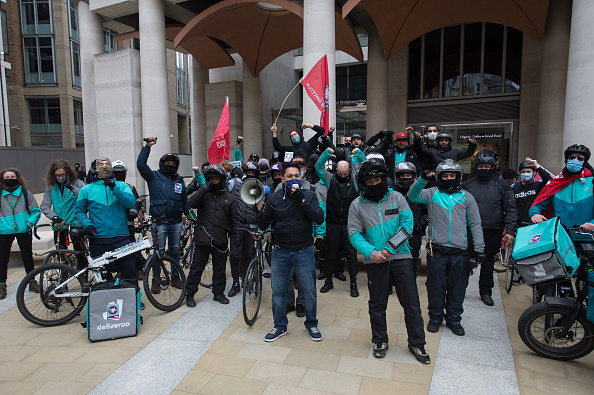
This opinion piece by Philippe Sion, Managing Director, Forced Labor & Human Trafficking at Humanity United and Phil Bloomer, Executive Director at the Business and Human Rights Resource Centre was originally published in Thomson Reuters Foundation News.
This month marks the 10th anniversary of the unanimous endorsement of the United Nations’ Guiding Principles on Business and Human Rights (UNGPs), which are meant to serve as global standards for preventing and addressing human rights abuses as the result of business activity.
Now, a decade later, we are calling on corporate and financial actors to finally stop lining their pockets with profits from worker exploitation and to hold up their end of the deal. We are also calling on governments to continue providing the incentives – positive and punitive – that these businesses need in order to act.
While the corporate sector was reluctant to comply while the UNGPs were merely a moral obligation, these principles are increasingly becoming a financial obligation as well.
Fallout from the COVID-19 pandemic has put human rights in business back on the agenda around the world. Just last month, UK food delivery service Deliveroo’s share price tumbled 30%, partly due to concerns for workers’ rights, and over the past year, the U.S. government has increased by 50-fold the amount of goods impounded at port suspected to have been produced with forced labor.
We cannot “build back better” from the tragedy of the COVID-19 pandemic without human rights at the core of the discussion about the economies of our near future. This anniversary is a timely reminder the UNGPs can help us do that.
The UNGPs rest on three pillars: the state duty to protect human rights, the corporate responsibility to protect human rights, and access to remedy for victims of abuse if the first two pillars are violated. While the UNGPs set an international legal standard that countries and companies around the world have officially endorsed, there has been no formal enforcement mechanism.
Thankfully, we’re now seeing mounting external pressure on companies to end the labor abuse and exploitation present in their own supply chains and to uphold the principles set forth ten years ago.
Countries such as France, Germany, Finland and the Netherlands are rapidly introducing legislation as part of a smart policy mix to support responsible companies with a level playing field, harmonized standards and legal certainty.
And while customers are increasingly and rightfully repulsed by the abuse of workers, investors who focus on Environmental, Social and Corporate Governance issues (ESG) are actively engaging and increasingly voting against complacent boards and their policies and workers’ movements are strengthening.
Another area of advancement is the development and adoption of so-called “mandatory human rights due diligence laws,” which impose on companies the legal obligation to prevent abuse in their operations and supply chains by identifying human rights risks and taking robust preventive action. Interest and actions around these laws are ballooning across Europe, North America, Asia and emerging economies.
While most companies profiting from forced labor have yet to adequately address the issue, some leading businesses are making strides in the right direction, while those that have refused are facing increasing pressure to take notice.
As the corporate law firm of White & Case put it in a recent letter to its clients, “companies face civil enforcement actions, potential criminal liability and reputational damage where slavery and forced labor is present in their supply chains… forced labor enforcement will continue to be a regulatory enforcement priority for the U.S. government,” and “proactive development and implementation of policies and procedures to ensure supply chain integrity and mitigate enforcement risk are critical.”
White & Case do not frame this as a moral imperative, but a business one, and similarly, this is where governments can – and clearly will – do more. In the ten years since the UNGPs’ endorsement by the UN, countries have taken modest steps toward meeting their responsibilities to protect human rights in business.
In fact just this week, in a move that emphasizes the seriousness with which global economies are taking the issue of forced labor, G7 countries (the United Kingdom, United States, Canada, Japan, France Germany and Italy) announced that they have “tasked their respective trade ministers to identify areas for strengthened cooperation and collective efforts toward eradicating the use of all forms of forced labor.”
The urgency for action is underscored by the due diligence scores in the Business and Human Rights Resource Centre’s most recent KnowTheChain corporate benchmark, which focuses on apparel and footwear fashion brands that collectively average a pitiful score of 41% in their efforts to tackle forced labor.
Company scoring ranges from just 3% and 5% (Shenzhou International and Prada) up to 89% (Lululemon). And only six of 37 companies report they involve workers in their assessments of the risk of forced labor in their supply chains, even though workers almost always have the greatest insight.
The majority of laggard companies face mounting risks from a variety of directions including prosecution under new laws in the EU, impounding of their imports in the U.S., and loss of market share and investors’ capital. These risks are only set to rise as pressures grow for markets to be remodeled to work for shared prosperity rather than only enriching shareholders.
On this 10th anniversary of the UNGPs, smart companies are voluntarily incorporating these principles into their own practices and leading companies are advocating for change amongst their peers. The laggards must now listen and follow.